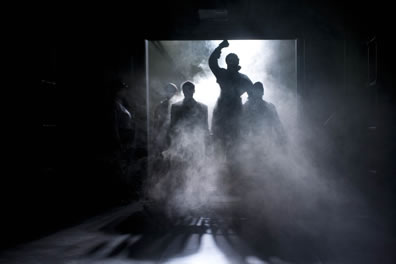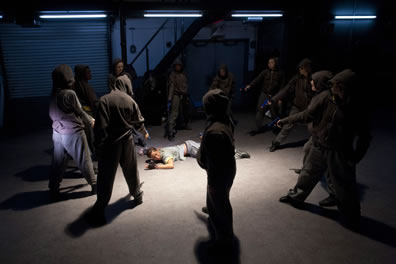Julius Caesar
A Caesar That Takes No Prisoners
Donmar Warehouse, St Ann's Warehouse, Brooklyn, N.Y.
Saturday, November 2, 2013, H–108&109 (middle, center bleachers)
Directed by Phyllida Lloyd
The whistle blows. The pack of people crowded into a space between two closed loading dock doors go silent to listen as the guy looking more security guard than usher tells us to turn off our cell phones now, points out the route to the rest rooms, and explains the rules of seating for the two-hour, no-intermission play. The big loading door in front of us raises open, and we herd in. The loading door closes behind us.

Julius Caesar (Frances Barber) arrives through the loading dock door at the women's penitentiary which serves as the setting for the Donmar Warehouse production of Julius Caesar at St. Ann's Warehouse. Every part is played by a female inmate—save one. Photo by Pavel Antonov, St. Ann's Warehouse.
We are seemingly in a women's penitentiary. Posters in the restroom warn visitors of the prison's antidrug policy. Others inform prisoners of services available to them if they are subjected to abuse. Out in the theater, the lightboard is disguised as a guard station. We can hear horns sounding and prisoners shouting beyond the walls. The loading door opens again, another pack of visitors walks in, and the door lowers shut. A short while later, an alarm blares, a door opens, and a dozen prisoners file in for a lineup. When, to a blaring industrial rock track, they suddenly scatter to various locations on the two-level set, the loading dock door is raised again, and emerging out of fog and bright light is another prisoner, wearing an overcoat, surrounded by guards.
This is Julius Caesar. She runs up to the catwalk and, aided by another prisoner (Antony), leads the others in a ritualized, rockin' rollin' celebration. A meek, worried, doll-carrying prisoner hands Caesar a horoscope—which tells her to beware the Ides of March—but the prison's alpha bitch turns the horoscope into a show. With unbridled shouts, the other prisoners run up to their leader and head to one end of the catwalk for a huddle, but two prisoners remain on the floor below. The tall woman starts to walk away, but the shorter woman reaches out and grabs the other's arm and asks, "Will you go see the order of the course?" "Not I," replies the other. "I am not gamesome: I do lack some part of that quick spirit that is in Antony. Let me not hinder, Cassius, your desires; I'll leave you." "Brutus, I do observe you now of late," the shorter woman says.
We have transitioned fully into Act One, Scene Two, of William Shakespeare's Julius Caesar, and in this remarkable Phyllida Lloyd-helmed production from London's Donmar Warehouse playing at St. Ann's Warehouse in Brooklyn, N.Y., we will get two versions of Julius Caesar—three really—wrapped into one.
Such a production—starting with its all-female cast (though one of the guards, er, ushers is a man)—can be accused of being mere gimmickry. As for the single-gender casting, can it still be considered a gimmick if it's done so frequently? This Julius Caesar is just one of six single-gender-cast productions of Shakespeare we've seen this year, and one of three we saw on this weekend. It's the third all-female Shakespeare production and the second all-female Julius Caesar we've seen this year (and, for that matter, the third female Cassius of the year). If gender is of no consequence to the action, and therefore the actor or actress is playing the woman or man as written, it's less a gimmick and more a casting choice.
In this production, gender does matter. It's a woman's prison. And though these actresses are playing men in Shakespeare's play (with the exception of Portia and Calpurnia), they are clearly women inmates.
And Rome is a penitentiary. Once past that non-Shakespeare opening scene, and aside from Caesar physically bullying Cassius at the time she is telling Antony to beware "Yond Cassius," who "has a lean and hungry look" (Caesar, who has placed a box of Krispy Kremes on the table, forcefully shoves a donut in Cassius's mouth), the production sticks to Shakespeare's script, with cuts, through Antony's famous funeral oration. The setting uses the palpable tension that is so much a fabric of prison life to portray the psychological state of Rome under Caesar, who, in Frances Barber's portrayal, is clearly established as the prison's heavy. The line that Cassius "Reads much, he is a great observer, and he looks quite through the deeds of men" resonates when coming from this particular Caesar's mouth. Brutus is ever-stoic but wary in the riveting performance of Harriet Walter, and Jenny Jules plays Cassius in a perpetual state of agitation that suddenly locks into a frightened stillness when Caesar enters. As Brutus and Cassius hear Casca (the grifter-like Susan Brown) describe Antony offering the crown to Caesar, they sit around a table pretending to read magazines. Caesar may be off stage, but there are guards everywhere, and they are not to be trusted.
As the conspiracy takes hold, a double sense of danger creeps into our conscience. We know this play, we know Caesar dies in the third act, we know Brutus gives a good funeral speech but Antony gives a better one, we know the conspirators are killed or driven out of Rome, and we know that civil war results and, eventually, Antony and Cleopatra. But you'll forget all that while watching this production. Knowing the Caesar we've seen in Barber's portrayal, knowing that this is a prison where walls have ears, and knowing that prisons have their own unique system of governance, we watch this well-worn play as if for the first time. The meeting of the conspirators in Brutus's garden vibrates with tension, and the decision of whether or not to kill Antony (Cush Jumbo) really matters to us: Perhaps in no other production do we so readily side with Cassius's opinion that Antony should go down with Caesar. Furthermore, as all this unfolds, we start wondering if a rival gang might emerge or whether the guards will intervene.
The tension intensifies in Caesar's scene with Calpurnia and the conspirators come to fetch him to the capitol. Caesar can only rule this prison by feel as well as fear and unwavering command, and we really cannot tell if this Caesar will follow Shakespeare's script and give in to Calpurnia's nightmare-fueled pleadings and decide not to go to the capitol. But she does, and as the conspirators use flattery, a reinterpretation of Calpurnia's dream, and promise of a crowning, Caesar not only gives in but strikes Calpurnia, who crawls away, all further evidence of this Caesar's ruthlessness.
Lloyd's staging of the assassination scene is wickedly effective. Caesar's arrival at the capitol is videotaped and shown on the wall for us to see. A visitor in the first row is displaced (poor guy is shown by one of the prisoners to a chair off to the side) and Caesar occupies his seat. Casca moves along the row behind Caesar to make the first knife thrust, and the rest of the prisoners, one by one, stab Caesar—and as we watch this unfold via the video, we can see disconcerted members of the audience watching on either side of Caesar: It is us who are the frightened senators in this scene, and we really are, if not frightened, certainly uncomfortable.
.jpg)
 Top, Harriet Walter as Brutus with bloody hands gives her funeral oration. At the end of her speech, she submerges into the crowd, somehow exchanges hoodies with Cush Jumbo, playing Antony, who then gives her funeral oration pleading on the floor for her life (bottom). Photos by Pavel Antonov, St. Ann's Warehouse.
Top, Harriet Walter as Brutus with bloody hands gives her funeral oration. At the end of her speech, she submerges into the crowd, somehow exchanges hoodies with Cush Jumbo, playing Antony, who then gives her funeral oration pleading on the floor for her life (bottom). Photos by Pavel Antonov, St. Ann's Warehouse.The funeral orations also are brilliantly effective. The assassins don red rubber gloves to represent Caesar's blood and, with such bloody hands, Walter's Brutus stands among the other prisoners, all wearing hoodies. Upon finishing her oration, she is swallowed by the crowd, and in the confusing hubbub, they suddenly form a circle with pistols drawn and pointed at Antony lying on the floor in the middle, pleading for her life: "Friends, Romans, countrymen, lend me your ears!" The way Walter melds into the hoodied crowd, and Jumbo emerges from it is effective in its own right, but hearing Jumbo give this most famous oration with life-or-death urgency is thrilling. Antony ultimately unleashes the prison riot—"Mischief, thou art afoot"—and we hear of Octavius's arrival: A rival gang is, indeed, emerging.
Then, just when you know you are really in Rome and Rome is really a prison, the guards do intervene; but it is to take the prisoner playing Cinna the Poet to an appointment, and another prisoner (Helen Cripps) is selected to carry on as Cinna, reading from the script. So, we are in a prison after all, and the women are merely staging Julius Caesar as a play. The audience doesn't get much time to register this, though, because the beating of Cinna turns into an all-out beating for real, the prisoners turning the "tear him to pieces" scene as an opportunity to unleash their inner violence, even on an innocent—indeed, an understudy—victim. The choreography makes the beating seem so real that we shuffle uneasily watching the violence, before Barber—now apparently serving as the play's director—stops the carnage.
Julius Caesar continues on into its second half with the prison shifting from being an allegory of Rome to an allegory of society. Everybody is playing a part in search of validation among their peers. Brutus and Cassius break into a discomforting rivalry played out before their friends, each trying to out-status the other. Trying to out-maneuver each other in toughness are Antony and Octavius (Clare Dunne, who switches from the pregnant, discombobulated Portia to a vicious gang leader as the second Caesar). The final scene, Brutus's death, is again broadcast on the video camera, and Octavius shoves aside Antony to get in the play's last speech. Jumbo as the prisoner playing Antony stomps around in frustrated anger that her status quo has never changed—the script, even, still makes her a second banana.
Then comes the biggest gotcha of the night (if you want to read the spoiler version of this review, click here), and with it the realization realize that the penitentiary we have entered might just be an allegory for our own selves. Even the most democratic of republics and most privileged of lives can become a prison for us, with power in the hands of certain heavies and our place dictated by rival gangs.
Call it gimmickry if you must; I call this version of Julius Caesar soul-shuddering Shakespeare at his most visceral, a play within a play, within the drama of our own reality.
Eric Minton
November 6, 2013
Comment: e-mail editorial@shakespeareances.com
Start a discussion in the Bardroom



 Find additional Shakespeareances
Find additional Shakespeareances